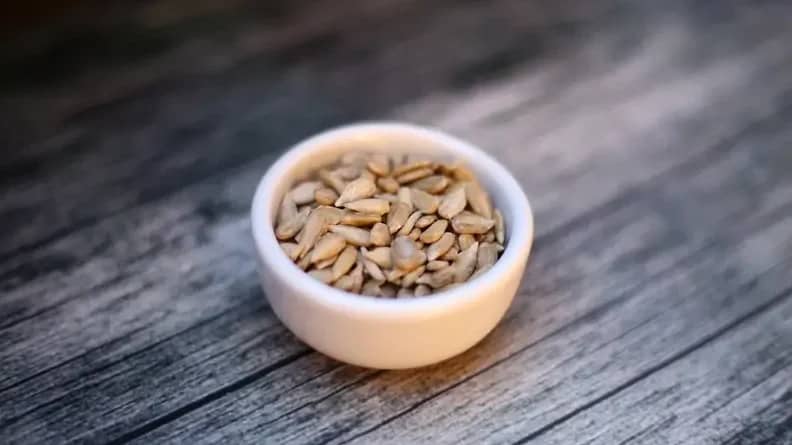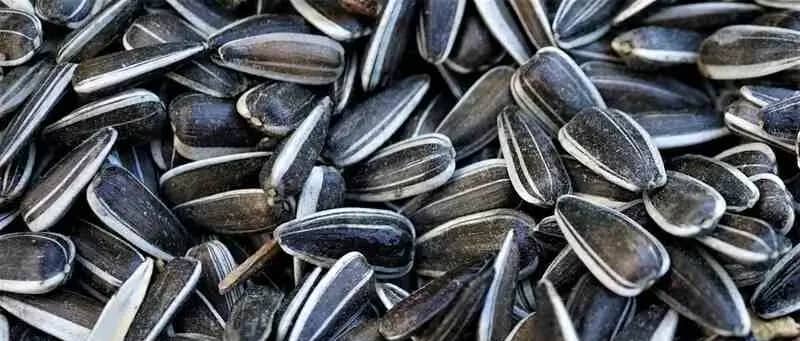Sunflower seeds are often overshadowed by the beauty of the flowers from which they came from but the fact is that sunflower seeds contains alot of nutrients and health benefits within their small shells.
These seeds have been enjoyed for generations, not just for their taste, but also for the health benefits that these seeds contain.
Sunflower seeds although are small in size but can reduce the risk of common health problems and type 2 diabetes. These seeds are packed with nutrients that can boost your wellbeing in various ways.
So, buckle up as, we’ll cover everything about sunflower seeds, their nutritional facts , health benefits and much more.
Table of Contents
ToggleWhat are sunflower seeds?
Sunflower seeds are the edible seeds that are harvested from the sunflower plant (scientifically known as Helianthus annuus). These seeds belong to the Asteraceae family, sunflowers are native to North America, particularly regions of present day Mexico and the southern United States.
Sunflower seeds are small, flat, and oval-shaped seeds that are typically inside a hard, black and white striped shell called hull. When you crack open the shell, you’ll find the edible seed nestled inside, often with a pale beige or greenish hue.
The plant is characterized by its tall, sturdy stalks and large, vibrant yellow flower heads, which contain hundreds of tiny seeds arranged in spiral patterns.
Historically, native peoples of North America have cultivated and harvested sunflowers for thousands of years. They utilized both the seeds and the oil extracted from them for various purposes.
What do they taste like
These seeds have a delicate texture and a mild, nutty flavor that pairs well with a variety of dishes.

How to eat sunflower seeds
When it comes to enjoying sunflower seeds, there are several ways to add or use them into your diet.
One popular method is to eat them as a snack on their own. Simply crack open the shell and pop the seed into your mouth for a satisfying crunch. You can also sprinkle them over salads, yogurt, or oatmeal for added texture and flavor.
Another way to eat sunflower seeds is to add them into baked goods, such as bread, muffins, or granola bars.
You can blend them into smoothies for a nutritional drink or use them as a topping for soups and stews. Some people even enjoy grinding sunflower seeds into a fine powder to use as a gluten-free flour alternative in baking recipes.
Whether eaten raw, roasted, or seasoned with your favorite spices, sunflower seeds are a versatile and nutritious addition to any diet.
Sunflower seeds nutritional facts
Sunflower seeds have an impressive nutritional profile, making them a worthy addition to any diet.
100g of sunflower seeds raw contains :
- Water: 4.87 g
- Calories: 609 kcal
- Protein: 18.9 g
- Fat: 48.4 g
- Carbs: 24.5 g
- Potassium: 657 mg
- Calcium: 116 mg
- Iron: 4.37 mg
- Zinc: 5.58 mg
- Manganese: 2.63 mg
Sunflower seeds are a potent source of essential vitamins and minerals. Which includes vitamin E, magnesium, and selenium.
Vitamin E acts as a powerful antioxidant that protects the cells from damage caused by free radicals. While on the other hand magnesium plays an important role in various bodily functions, including nerve and muscle function.
Health Benefits of Sunflower Seeds
Sunflower seeds contains alot of health benefits as these seeds are rich in healthy fats, vitamins, minerals, and antioxidants.
All of which plays an important role in supporting overall health and well being. Some of the health benefits of sunflower seeds are :
Heart health benefits
Consuming sunflower seeds regularly has been linked to improved heart health.
As high blood pressure is a risk factor for heart disease. The healthy fats found in these seeds help lower LDL (bad) cholesterol levels while increasing HDL (good) cholesterol levels, thus reducing the risk of heart disease and stroke.
A study was also conducted on 22 participants that noticed a decrease in bad cholesterol.
Weight Management
Despite the small size of sunflower seeds. They are surprisingly very filling, thanks to their high fiber and protein content.
Including these seeds in your diet can help keep you feeling fuller for longer, reducing overall calorie intake and aiding in weight management.
Besides sunflower seeds , flax seeds can also help in weight management.
Reduced Inflammation
Chronic inflammation is a risk factor for many chronic diseases. Which includes heart disease and type 2 diabetes.
Sunflower seeds have vitamin E, flavonoids, and other plant compounds which have anti inflammatory properties.
Eating sunflower seeds regularly has been linked with lower levels of inflammation. Which can have reduced risk factors for chronic diseases.
While more research is needed to establish a causal relationship, the anti-inflammatory effects of vitamin E are well-documented.
Boosts Immune System
Sunflower seeds contains various nutrients that support a healthy immune system.
Sunflower seeds contains vitamin E, zinc, and selenium.
These nutrients mentioned above works together to strengthen the immune system. Which can help you body to tackle any infections and illness more efficiently.
Antioxidant Properties
Antioxidants are compounds that help normalize harmful free radicals in the body. Which can reduce the risk of chronic diseases and inflammation.
Sunflower seeds also have antioxidants such as vitamin E and selenium, which help protect cells from oxidative stress and promote overall health.
Precautions and Potential Downsides
While sunflower seeds offer various number of health benefits. It is also necessary to be aware of certain precautions and potential downsides. Which are associated with consumption of sunflower seeds. Here are a few points to keep in mind:
Calorie Density
One downside is their calorie density. Sunflower seeds are relatively high in calories, especially when consumed in large quantities.
This can be a concern for individuals trying to manage their weight or restrict calorie intake.
Sodium Content
Another downside is their sodium content, particularly in commercially processed sunflower seeds.
Salted or flavored varieties can be high in sodium, which may contribute to high blood pressure or other health issues, especially if consumed in excess.
Fiber and Bulk Formation
Sunflower seeds are rich in dietary fiber, which is known for its ability to add bulk to stool and promote regular bowel movements.
However, consuming an excessive amount of fiber, including from sunflower seeds, without adequate fluid intake can lead to the formation of large, hard stools that may be difficult to pass.
To minimize the risk of digestive issues. It is essential to consume sunflower seeds in moderation and ensure adequate hydration.
Drinking plenty of water throughout the day can help soften stools and facilitate their passage through the digestive tract.
Allergic Reactions
Note: Some people may experience allergic reactions from sunflower seeds. However it is quite rare but still there are some reported cases.
Similar to other seeds and nuts. Symptoms can range from mild itching or swelling to more severe reactions such as difficulty breathing or anaphylaxis in rare cases.
Individuals with known seed or nut allergies should exercise caution when consuming sunflower seeds.
How to eat sunflower seeds
Sunflower seeds are incredibly versatile and can be added into a wide variety of dishes.
Whether you enjoy them as a snack or as an ingredient in your favorite recipes.
Here are some of my recommended ways to include sunflower seeds in your diet:
Stir them into homemade granola bars for an extra dose of protein and healthy fats.
- Add sunflower seeds to trail mix for a crunchy and nutritious snack.
Sprinkle sunflower seeds on top of a leafy green salad for added texture and flavor.
Mix them into hot or cold cereal to enhance the nutritional value of your breakfast.
Add sunflower seeds to fruit or yogurt for a satisfying and nutritious dessert.
Toss sunflower seeds into stir-fries for an added nutty crunch.
Add them into tuna or chicken salad for extra flavor and texture.
Sprinkle sunflower seeds over sautéed vegetables to enhance the dish’s taste and nutritional profile.
My personal favorite : Use sunflower seeds in place of pine nuts to make a delicious pesto sauce.
Top casseroles with sunflower seeds for a crunchy and nutritious twist.
Grind sunflower seeds and use them as a coating for fish to add flavor and texture.
Add sunflower seeds into baked goods such as bread and muffins for a nutty twist.
Dip an apple or banana in sunflower seed butter for a healthy and flavorful snack option.
Add sunflower seeds into your smoothies for a creamy texture and added nutrients. Simply take a handful of seeds and then add them into your blender along with whatever fruits you like, vegetables, and liquids, then blend until smooth to enjoy a nutrient filled smoothie.
It’s important to note that sunflower seeds may turn blue-green when baked.
This is a harmless chemical reaction between the seeds’ chlorogenic acid and baking soda. To minimize this reaction, you can reduce the amount of baking soda used in your recipes.
To store sunflower seeds effectively. Keep your seeds in a cool, dry place away from direct sunlight and heat sources.
Transfer these seeds to an airtight container to prevent moisture and air exposure. Which will preserve their freshness and flavor.
Final Thoughts
Sunflower seeds offer a wide range of nutritional benefits which can play a beneficial role in your overall health by keeping your heart healthy, reducing inflammation, managing weight and helping you in fighting type 2 diabetes.
With sunflower seeds rich nutrient profile and versatility. Adding sunflower seeds into your diet can be a simple and delicious way to boost your wellbeing.
Just remember to eat sunflower seeds in moderation, practice portion control, and ensure proper storage to enjoy the full benefits of these nutritious seeds.



2 thoughts on “Sunflower Seeds: Nutritional facts, benefits and much more”